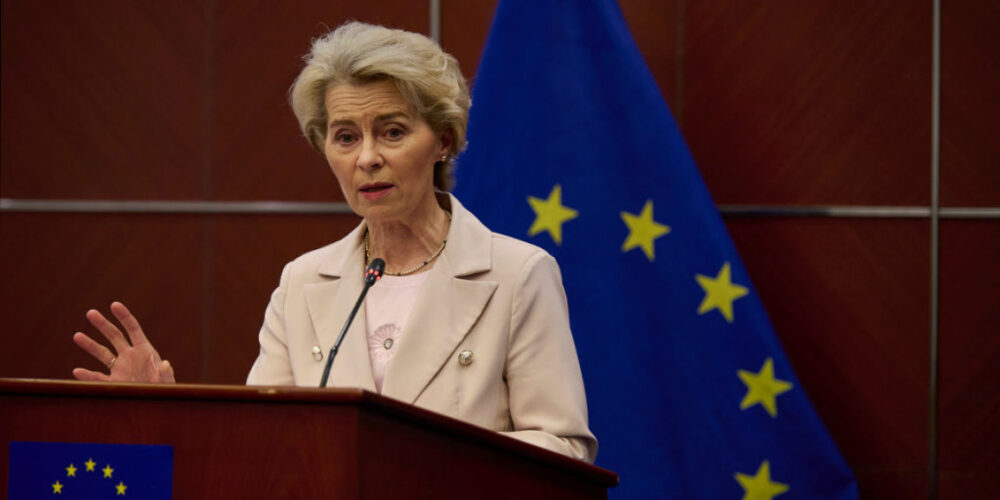As European institutions begin another five-year term in Brussels, it’s worth highlighting the extent to which the EU is complicit in genocide.
Political support
Following the 7 October attacks, European Commission (EC) President Ursula von der Leyen posted an image of the EC headquarters in Brussels lit up in the Israeli flag declaring ‘Israel has a right to defend itself – today and in the days to come. The European Union stands with Israel’. This signalled EU approval for Israel to begin its military campaign in Gaza. In the first 24 hours 400 Palestinians were killed.
On 11 October, Ursula von der Leyen joined European Parliament President, Roberta Metsola, European Council President, Charles Michel, and Haim Regev, Israel’s ambassador in Brussels, in a ‘solemn moment’ held in the forecourt of the European Parliament to commemorate Israeli victims only, even though by then 1100 Palestinians had been killed. Two days later on 13 October von der Leyen and Metsola touched down in Israel for a photo-op with Israeli leaders telling them that Israel has ‘the right and duty to respond to Hamas’ act of war’.
For weeks, European leaders wrangled over semantics before eventually calling for ‘humanitarian corridors and pauses’ suggesting that genocide is fine as long as Israel takes a break every now and then. It took the bloc until 21 March to call for a ceasefire, a move that President Charles Michel claimed made the EU ‘a credible actor’. By then over 31,000 Palestinians had been killed, Gaza had been reduced to rubble and starvation had taken hold affecting the Strip’s 2.3 million people. The European Parliament was marginally faster having called for a ceasefire on 28 February but a day later it overwhelmingly rejected a resolution that called for an arms embargo.
Following the European elections in June, EU leaders returned von der Leyen and Metsola to their positions at the Commission and the Parliament, while Charles Michel still holds the presidency of the European Council. As recently as 13 August he held a phone conversation with Israeli Prime Minister Netanyahu.
Material support
Israel’s genocidal war on Gaza is possible only because of the arms supplied by Western states. While much attention is given to the US as Israel’s main arms supplier, EU member states come in second. Germany provided 30% of Israel’s arms between 2019-2023 and its exports to Israel in 2023 were worth €326.5 million having increased tenfold from the previous year with the vast majority of licences being approved after 7 October. Moreover, much of the weaponry supplied by the US is fitted out with European manufactured components. In addition, EU member states facilitate the transit of US arms shipments through their territory on the way to Israel.
For years Israeli entities have been given a free reign to access EU research funding, even though those in receipt of this money are often directly connected to Israel’s apartheid state and military apparatus. This has continued since 7 October with at least two research projects directly funding Israel Aerospace Industries (IAI), one of Israel’s largest arms companies. As well as funding Israeli arms companies directly through research grants or from the purchase of military equipment such as drones, at least €426 million of European public money goes to European arms companies that arm Israel.
EU Complicity in genocide looks set to continue
Although EU Israel relations are underpinned by the Association Agreement, which contains a human rights clause, the EU has failed to invoke it, preferring instead to adopt a ‘business as usual’ approach to Israel as it commits a genocide. In doing so the Union has abandoned the façade of being concerned with human rights and the rule of law and has exposed its racist and imperialist core.
At every turn the EU has shown itself to be entirely unwilling to impose sanctions, an arms embargo or to prohibit the flow of US arms through Europe on their way to the Middle East. Considering the same genocidal warmongers have been returned to their positions in Brussels, it’s unlikely that the EU’s institutional support for genocide will change any time soon.






